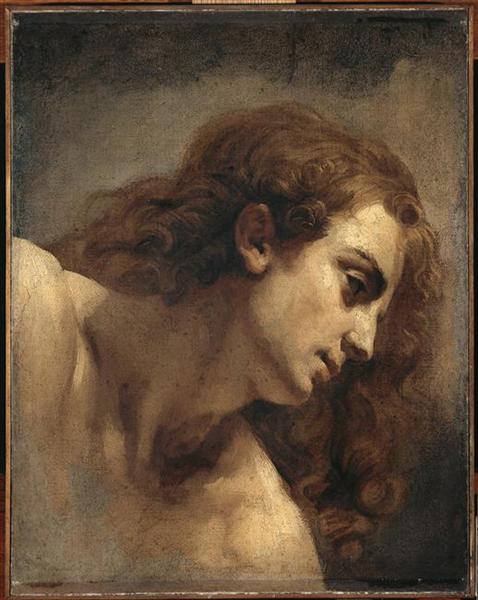Description
The work "The head of the young man" (The Head of Young Man) by Théodore Géricault, one of the most prominent figures of French romanticism, is a deep and moving study that encompasses the complexity of human experience through the representation of a Only face. Painted around 1818, this work is a paradigmatic example of Géricault's exploration about psychology and emotion through painting, as well as a testimony of its mastery in the representation of the portrait.
The composition of the work is intriguing in its simplicity; Géricault presents a dramatic foreground of the face of a young man, which immediately captures the viewer's attention. The young man's head occupies almost the entire space of the canvas, which intensifies his expressiveness. This compositional choice not only establishes an intimate connection between the viewer and the subject, but also allows an almost sculptural approach to the shape of the face, emphasizing volumetry and details. The direct look of the young man, in combination with his slight head inclination, suggests a mixture of introspection and vulnerability, inviting the observer to contemplate the emotions that inhabit the character.
Géricult uses a palette of terrible colors that brings a sense of realism and humanity to the work. Soft skin tones are contrasted with darker nuances that accentuate deep shadows, creating an atmosphere of gravitas that catches attention. This use of color is characteristic of romanticism, where the search for emotionality and visceral connection with human experience prevails. Through the play of lights and shadows, the painter reveals the complexity of the human condition, suggesting that behind each face there is a story to tell.
Although "the young man's head" may seem, at first glance, an individual portrait, his power lies in his universality. The young man's image can represent a series of ideas about youth, yearning and the search for identity in a changing and tumultuous world. Romanticism is defined by its ability to express often conflicting emotions of the human being, and this portrait encapsulates that essence, becoming a symbol of the tragic and poetic potential of youth.
It is interesting to note that Géricault was a pioneer in the exploration of anatomy and the study of the fictional dragon, influenced by his own interest in the study of human bodies and the expression of his pathologies. The work reflects this research, by presenting a face that, although idealized, houses raw emotions that are often relegated in the representation of classical humanism. Through styles and techniques that recall the masters From the past, Géricault gives its subject a dignity that transcends the merely physical.
In the work we can observe the present influence of other painting techniques, such as chiaroscuro and the influences of the Baroque, which are combined with the typical romantic approach of Géricult. His dedication to capture the essence of the human being, in conjunction with a masterful technique, makes "the head of the young man" a piece that is not only visually impressive, but also pays tribute to the complexity of human experience.
In conclusion, "the head of the young man" is not only a sample of the indisputable talent of Théodore Géricault, but also a provocative reflection on youth and its fragility. Through his technique and sensitivity, Géricault challenges the viewer to look beyond the surface, inviting him to explore the deep reservoirs of the emotion they reside in the representation of his young subject, which makes this work a milestone within the repertoire Artistic of romanticism and in a lasting legacy in art history.
KUADROS ©, a famous paint on your wall.
Hand-made oil painting reproductions, with the quality of professional artists and the distinctive seal of KUADROS ©.
Reproduction service paintings With a guarantee of satisfaction. If you are not completely satisfied with the replica of your painting, we refund your money 100%.

